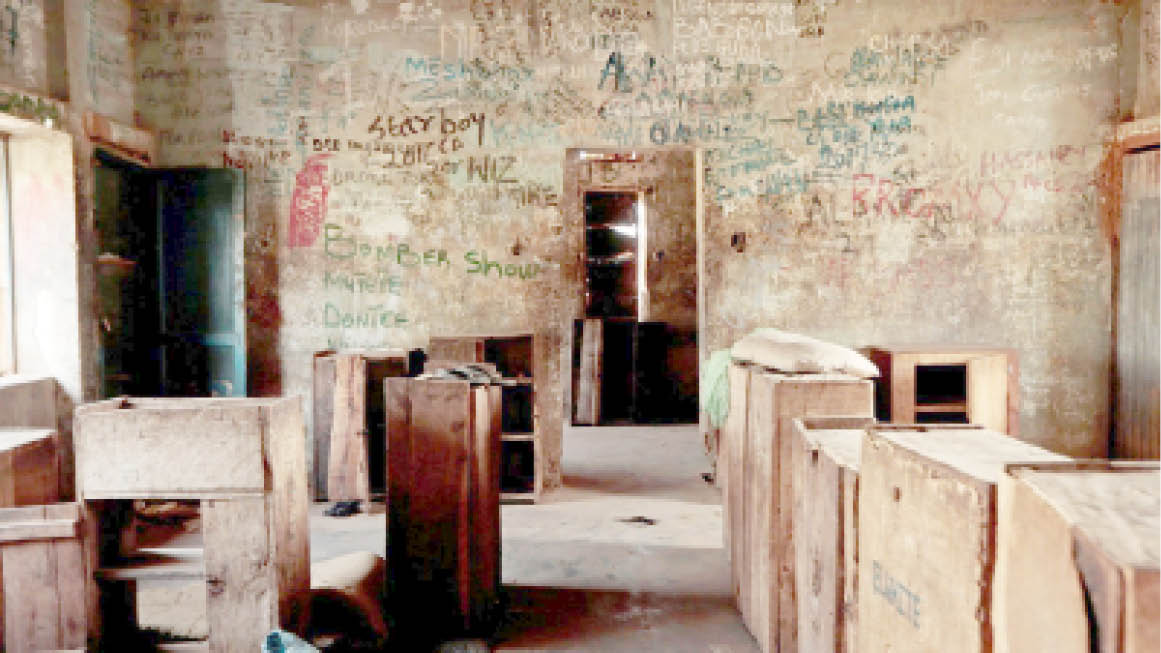Column No.6: A plea for an education on education
I read yesterday that the Minister of State for Education, Emeka Nwajiuba, at the official flagging-off of the World Bank-sponsored Better Education Service for All (BEDSA) in Dutse, Jigawa State put the current number of out-of-school children in the country at 10 million. The news story analysed the implication of an increase of 3,054,000 from […]

Classroom in GSC Kagara, Niger State
I read yesterday that the Minister of State for Education, Emeka Nwajiuba, at the official flagging-off of the World Bank-sponsored Better Education Service for All (BEDSA) in Dutse, Jigawa State put the current number of out-of-school children in the country at 10 million. The news story analysed the implication of an increase of 3,054,000 from the 6.946 million the figure stood at just last year. This is after the Minister of Education, Adamu Adamu, in January said the number of out-of-school children which was 10.1 million in 2019 had dropped to 6.946 million in 2020.
While Nwajiuba said Jigawa State was one of the worst-hit, he also said Nigeria as a whole has the highest number of out-of-school children in Sub-Saharan Africa. The report pointed out that the minister of state did not mention the factors responsible for the increase, and went on to add that for the nation to address these challenges adequately, “it must strengthen the quality of basic education by confronting head-on those factors denying children access to basic education”. After stating obvious by describing the current figure of out-of-school children as disturbing, he implored state governments and other stakeholders to join the Federal Government in addressing the issue, “since it affects the development of the country”, stating even more of the obvious.
- Adamu Dauda, from rearing cattle to a university lecturer
- Davido to feature as taxi driver in Hollywood movie
Cue in political chest-beating, this time from Jigawa State’s governor, Muhammad Badaru Abubakar, who reportedly said to address the issue of poor enrolment of children and others, his government recruited 1,393 teachers in 2018. Don’t get me wrong, the governor is doing his best, obviously. But how on earth does that figure translate into the kind of progress that is required, or even needed? Mind you, not just in Jigawa State, but in all the states in the North. I am forced to think that the problem is that many Nigerians – especially elected officials – seem to be blissfully unaware of the importance of education, or have forgotten it via some twisted version of selective amnesia. You know, the kind that would put an ostrich with its head in the sand to shame.
We already have far too many problems dogging the sector in Northern Nigeria especially, and one would need reams and reams of paper to list them all. But right now, the two biggest on account of their deadliness – literal and figurative – would have to be Covid-19 and terrorists. I say terrorists to mean and include the loosely-labelled bandits, and kidnappers. The coronavirus pandemic had schools shut, and were only reopened not too long ago. That was roughly the time the terrorists began to strike, in Katsina, Niger, Zamfara, and Kaduna states, in daring operations that terrified the nation and sparked outrage. Unfortunately, it also brought about school closures, and a growing apprehension for school environment in parents and guardians.
Factor in cultural impediments that rally against education in Nigeria – especially that of the girl child – and the problem becomes an even more monumental one. This is especially evident in recollections of the released Zamfara schoolgirls wherein they narrated that some of their kidnappers expressed interest in marrying them, because “school is a waste of time for girls”. It is quite telling how abysmally we’re doing in the sector of education. But look at the contrast shown in the case of a father who was kidnapped, only for his own daughter to also get kidnapped and brought to the same den. He signalled to her to keep mum on their ties in order to prevent complications, which she did most smartly. After being freed, he said in the news that now more than ever he is aware of the importance of education, as an uneducated child might have given them up.
While you ponder that, let me point out that I’m not here preach the importance of education, because if you’re reading this, you’re already aware of that fact. Also, the details of the terrorists’ derring-do remain fresh on our collective minds, so there’s no need for a recap. But other issues which that darkness shed light on include the ridiculously wretched levels of quality – or a lack thereof – of the infrastructure (if we can call it that) of our schools, especially those in rural areas, the traditionally worse-off of them all. Yes, I’m looking at you, Niger State. It’s almost as if we are making education as unattractive as possible, while expecting citizens to be drawn to it enough to send their children to environments that are getting more dangerous, by the day.
One of the biggest ‘Wow!’ moments of the Muhammadu Buhari presidency for me, remains the appointment of Malam Adamu Adamu as the Minister of Education. I was very, very happy to hear of it, and naturally, I had lofty expectations going by the kind of professional and intellectual precedents he had. But fast-forward to today, and I’m still waiting to see some of that hard-core change I expected in the sector. Even though one would expect basics to be in place, and maybe even hope for some dramatic improvement, that’s not necessarily the case right now. It’s beginning to look like my expectations have not been realistic. If that is the case, someone should please educate me, pun unintended.
